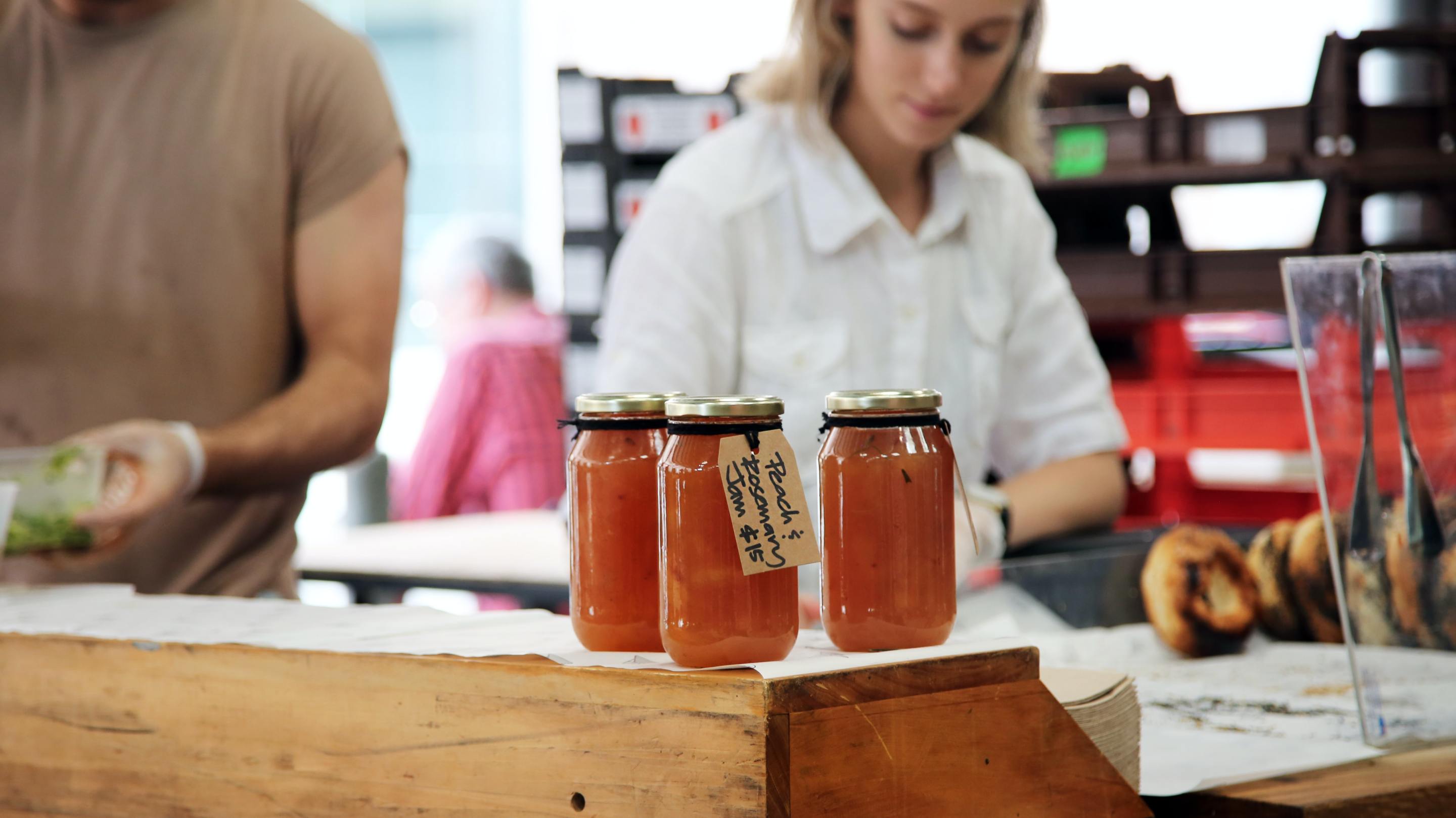You may not be familiar with Minnesota's cottage food law—the statute that allows small-scale producers to sell certain homemade foods—but cottage foods are all around you. The jars of raspberry jam and dill pickles at the farmers market. The stack of pastel-hued macarons in your Instagram feed. The dinosaur-shaped cake at your niece’s birthday party.
Minnesota is home to over 4,000 registered cottage food producers representing nearly every county in the state. And though they work out of their home kitchens, they’re anything but amateurs. They have a professional association (the MNCFPA) that organizes an annual conference, administers a private Facebook group with nearly 1,000 members, and provides resources to help producers navigate the requirements of the cottage food law, which took effect in 2015 after several years of grassroots lobbying.
“Our whole idea was starting small and having little financial risk,” says Jessica Pearse, who co-owns Nana’s Bake Shoppe with her husband Billy. The Minnetonka bakery specializes in authentic British baked goods such as scones and tarts. “Cottage food allows us to be creative and accomplish our mission while still testing the market.”
Other benefits of cottage food production are less tangible. “The connection with each client, that’s what makes it fascinating,” says Amina Adeyemi, owner of Veeyon Cakes in Eden Prairie. “The smiles, the excitement customers get when they see your creation.” Adeyemi started as a hobby baker, but her talent for creating whimsical, kid-friendly cakes garnered admiration from her friends, who encouraged her to launch a business.
But for the first few years, it was nearly impossible to earn a living wage as a cottage food producer. There are rules: You have to register annually and complete a basic food safety training course. Products must be labeled, and you have to sell directly to consumers, either out of your home or at an event like a farmers market. And producers are subject to a sales cap.
“The income cap was $18,000 [under the original law],” explains Jennifer Carriveau, MNCFPA vice president. “The government is effectively regulating a hobby at that point. It’s not possible to make a living. That’s especially true once you deduct the cost of ingredients, packaging, increased utility bills, liability insurance, and other expenses.”
Beyond providing resources to cottage food producers, the MNCFPA has spent the past several years lobbying to fix problems with the 2015 cottage food law. In addition to the income cap, there was the issue of business organization: Unlike every other legally operating business in the state of Minnesota, cottage food producers were prohibited from organizing their businesses as limited liability companies (LLCs), which would prevent them from being held personally responsible for the debts of the company in the event of a suit or bankruptcy.
For example, a customer could slip and fall on the way to pick up an order. “[As a cottage food producer], you’re working out of your home. If you had an accident on your property, if you’re not an LLC your personal assets are at risk,” says Carriveau.
The LLC issue was also a problem for cottage food producers who wanted to expand, according to Shelley Erickson, MNCFPA president. Some people were unable to secure loans since their existing businesses weren't organized as LLCs.
The MNCFPA’s initial push to update the cottage food law was stalled by the pandemic, but they renewed their efforts during the 2021 legislative session. In an increasingly rare show of bipartisan cooperation, Sen. Andrew Mathews (Republican-Princeton) and Rep. Samantha Vang (DFL-Brooklyn Center) authored the Senate and House bills, respectively. Then, the MNCPA mobilized their Facebook group in a grassroots lobbying effort.
“COVID helped, in a way,” says Erickson. “Instead of going to the Capitol and going to every office, we could make a Zoom meeting and make sure that for every senator or representative, we had a [cottage food producer] constituent from their area at that meeting.”
Eventually, the updated cottage food law passed as part of an omnibus bill and went into effect in August of last year. The income cap was increased to $78,000, and cottage food producers are now allowed to organize their businesses as LLCs, enabling people to earn a living wage without taking on inordinate financial risks.
The updated cottage food law preserves the best aspect of the original version—reducing cost barriers for food entrepreneurs. Registration and training are free for producers whose annual food sales are less than $7,665. For producers who sell $7,666 to $78,000, the annual registration fee is $50 and the training course (required every three years) is an additional $50.
The cottage food law is also a boon for farmers, who can make products with their produce and are often based in rural areas where commercial kitchen space may not be available.
“We use our cottage foods business to preserve a lot of our produce when we have extras of something—when cucumbers are really in season we make relish and pickles,” says Betsy Wentz, who owns Rotational Roots, a regenerative farm in Cannon Falls, with her husband Caleb. “During the early season at the farmers market, [our cottage food] draws people in when we don’t have as much produce. It’s a really great way to connect with customers.”
In addition to jams, jellies, pickles, and cowboy candy (a.k.a. sweet pickled jalapeno, Caleb’s specialty), Wentz sells baked goods for Christmas and Valentine’s Day. “With cottage foods, we can support ourselves and not have to have to get a second job in the winter when farming is slow.”
Cottage food is also part of the business model for Laura Thompson, owner and operator of Thompson Family Farm in Farmington. An avid canner, Thompson appreciates the convenience of operating her cottage food business on her farmstead. “It is very common for me to run out to the garden to grab another bell pepper or a few more onions for my latest canning project,” she says. “If I'm making pickles, I typically harvest the cucumbers and also the dill within about an hour of putting them into jars.”
“It is so great to have the chance to share my love of canning and baking, without the added expense of renting a commercial kitchen space,” she continues. “Also, the network of cottage food producers in Minnesota is amazing—I have made some great friends through my business, people who I likely would have never met if it hadn't been for cottage food.”
In addition to benefiting individual producers, Minnesota’s cottage food law benefits the state, economically and otherwise.
“It’s super important for people who work from home, for people who have disabilities, for people who are retired and want to supplement their income,” says Erickson. “There are so many ways that the cottage food industry helps with the economy—it helps people make a living.”
Then there are the noncommercial benefits. The pandemic demonstrated that we can’t always rely on national supply chains, and sourcing foods locally can provide peace of mind. Cottage foods offer additional options for people with food allergies or specific dietary preferences, especially in rural areas where there isn’t enough demand for a brick-and-mortar gluten-free bakery. There’s the personal connection between producer and consumer, which the cottage food producers we spoke with mentioned again and again.
When you purchase products from Minnesota’s cottage food producers, you’ll be treated to luscious jams and delightful baked goods. But the sweetest reward is supporting a scrappy, up-and-coming industry, one cookie at a time.






